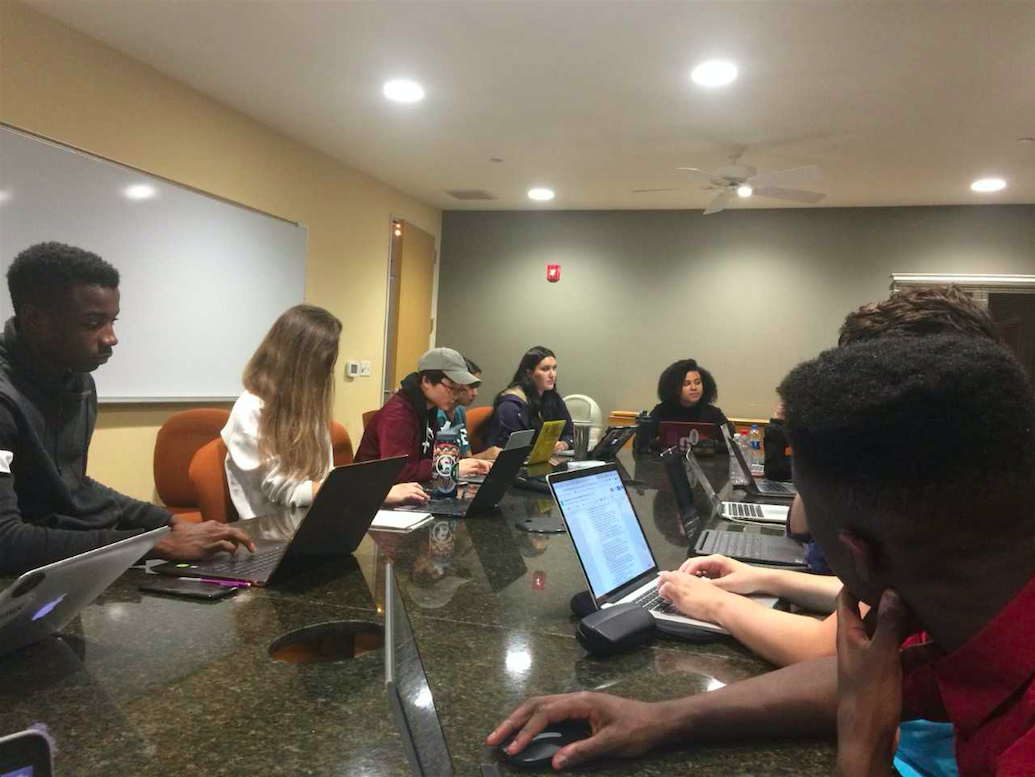In its 10th meeting, the 20th Undergraduate Senate reported on multiple Senator’s personal projects, including proposals to establish a First Generation and Low-Income (FLI) dormitory and community center as well as to create a successor to the Cardinal Conversations program.
Other projects discussed included ongoing efforts to offer an option to take MATH 51 over two quarters instead of one, advocacy for a community center for people with disabilities and preliminary research on creating a Carta-like search platform for student groups and activities.
Senator Tyra Nicolay ’21 discussed her work with FLI students and the First Generation and Low-Income Partnership (FLIP) on creating both a dormitory and a community center for FLI students.
“In the past years, the FLI office, formerly known as DGen, has been very useful,” Nicolay said. “However, it’s not been a community space. It’s always been an office. I and a lot of other FLI students think it’s really important to have a community space.”
In addition, Nicolay cited her experience living in Muwekma-Tah-Ruk, the Native American ethnic-themed dorm, to argue for the importance of a FLI dormitory, saying that it is “very useful to be able to talk to upperclassmen who were also in your shoes.”
Nicolay admitted that creating a dormitory and community center for FLI students will likely take 20 or 30 years. She hopes to gradually work toward that goal, initially focusing efforts on the introduction of a FLI theme into an existing dorm. As inspiration, Nicolay pointed to the creation of Muwekma-Tah-Ruk, which was the theme of the Roble basement before becoming a separate dormitory.
In addition to working toward the creation of a FLI dormitory and community center, Nicolay is meeting with Stanford administrators to discuss the renaming of buildings named for Junipero Serra, the controversial founder of the California mission system. Recently, the renaming committee recommended renaming the Serra freshman dorm, Serra House and Serra Mall. If the committee’s request is approved, Serra Mall will be renamed to Jane Stanford Way.
According to Nicolay, the first renaming committee received many suggestions to rename buildings that currently have Serra’s name after indigenous people. She hopes to work with the Stanford administration to do so in some cases.
“We have only one thing named after indigenous people, but we have multiple things named after Jane Stanford,” Nicolay said.
Later in the meeting, Senator Matthew Wigler ’19 discussed his work on advancing meaningful dialogue in response to increasing political polarization on campus. He defined six qualities that he sees as necessities for meaningful dialogue: community, conversation, continuity, inclusion, equality and accountability. He added that the Cardinal Conversations program fails to adequately meet each of these six criteria.
“Cardinal Conversations is poorly designed to encourage real dialogue and must either be replaced or supplemented by a student-centered program,” Wigler said.
In a memorandum, Wigler criticized the Cardinal Conversations program for holding “speeches and lectures rather than discussion,” with students only able to ask questions. He further alleged that Cardinal Conversations has overwhelmingly hosted conservative speakers, prompting mostly conservative audiences to engage in the program.
According to the Cardinal Conversations website, “Cardinal Conversations is a forum for the Stanford community to explore a diversity of ideas on challenging issues with leading thinkers and public intellectuals from campus and beyond.”
During the 2017-2018 school year, the program was plagued by scandal. In September, Provost Persis Drell announced a plan to change and revitalize the Cardinal Conversations program, admitting that “there were several bumps in the road” during the inaugural year of the program. In a “Notes from the Quad” blog post, Drell agreed with Wigler that the program had a “lack of diversity,” stating that it was “an issue that we tried to address later in the series.”
In her blog post, Drell announced “substantial changes” to the program, including “new faculty leadership and a new, more transparent student committee selection process to ensure broader representation.” In addition, Drell said she intends to create a committee of faculty and students to “reexamine the program format and structure and aim to present a more diverse group of speakers and topics.”
However, Wigler said he believes that it is necessary to create a new program to advance dialogue on campus, stating that the Cardinal Conversations program is “deeply troubled.” In his memorandum, he proposed Deliberative Dinners, a program which would take the form of free and high-quality weekly dinners in which undergraduate students could directly debate issues with each other, potentially for academic credit. He further proposed that a trained faculty member oversee the discussion and ensure that all voices be heard. Wigler plans to introduce a bill to the ASSU in the future, officially proposing the Deliberative Dinners program.
Contact Ricky Grannis-Vu at rickygv ‘at’ stanford.edu.
